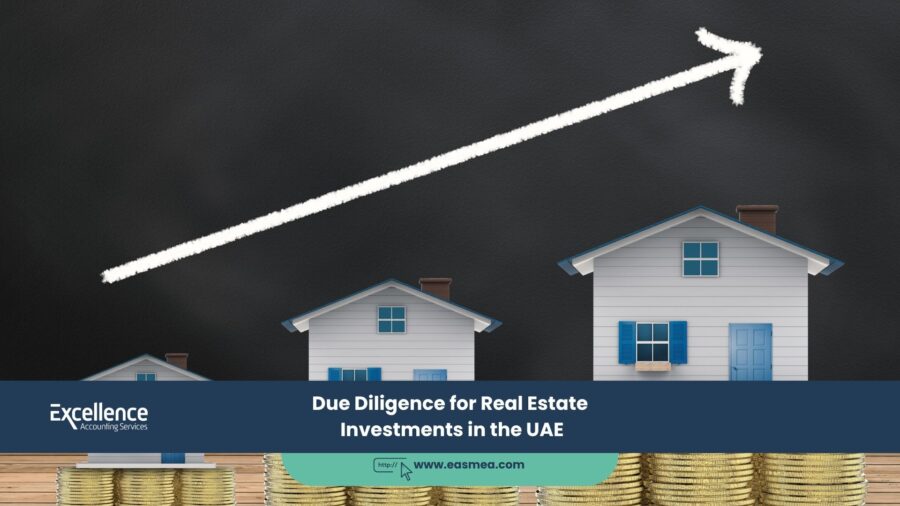A Comprehensive Guide to Due Diligence for Real Estate Investments in the UAE
The UAE, and Dubai in particular, boasts one of the most dynamic and attractive real estate markets in the world. From high-yield rental apartments to luxurious villas and prime commercial spaces, the opportunities for investors are plentiful. However, beneath the gleaming skyline lies a complex landscape of regulations, service charges, and market fluctuations. For any savvy investor, success is not just about finding the right property; it’s about conducting thorough **due diligence** to ensure the investment is sound, secure, and free from hidden liabilities.
- A Comprehensive Guide to Due Diligence for Real Estate Investments in the UAE
- Why Due Diligence is Non-Negotiable in the UAE Market
- The Core Components of Real Estate Due Diligence
- Financial Clarity for Your Real Estate Investment with EAS
- Frequently Asked Questions (FAQs)
- Invest with Confidence. Not Hope.
Real estate due diligence is a comprehensive investigation into a property before the purchase is finalized. It is the process of “looking before you leap.” It goes far beyond admiring the view from the balcony; it involves a deep dive into the legal status, financial health, and physical condition of the property. Neglecting this critical step is one of the biggest risks an investor can take, potentially leading to financial losses, legal disputes, and significant unforeseen costs.
This guide provides a detailed framework for conducting real estate due diligence in the UAE. We will break down the essential components—legal, financial, and physical—and explain why partnering with professional advisors is the key to making a confident and profitable investment decision.
Key Takeaways
- Due Diligence is Essential Risk Management: It’s a mandatory investigation to uncover hidden legal, financial, and physical issues before you commit to a property investment.
- Legal DD is Paramount: Verifying the Title Deed, checking for mortgages with the Dubai Land Department (DLD), and scrutinizing the Sale and Purchase Agreement (SPA) are non-negotiable steps.
- Financial DD Determines Profitability: This involves analyzing service charge history, calculating potential net rental yields, and assessing the overall financial viability of the investment.
- Physical DD Prevents Costly Surprises: A professional inspection or “snagging” report is crucial to identify construction defects, MEP (Mechanical, Electrical, Plumbing) issues, and the overall condition of the property.
- Off-Plan vs. Secondary Market: The due diligence process differs. For off-plan, the focus is heavily on the developer’s reputation, financial stability, and RERA compliance, including the status of the project’s escrow account.
Why Due Diligence is Non-Negotiable in the UAE Market
Investing in UAE real estate without proper due diligence is a high-stakes gamble. The process is designed to protect you from a range of potential problems:
- Title and Ownership Issues: Ensuring the person selling the property is the legitimate owner and has the right to sell.
- Hidden Debts and Mortgages: Uncovering any existing mortgages or liens on the property that must be cleared before transfer.
- Excessive Service Charges: Understanding the true running cost of the property, as high service charges can significantly impact your net rental yield.
- Construction Defects: Identifying poor workmanship or structural issues that could be expensive to rectify.
- Developer Risk (for Off-Plan): Assessing the risk of project delays or non-completion when buying directly from a developer.
In real estate, you make your money when you buy, not just when you sell. Thorough due diligence is what ensures you buy right.
The Core Components of Real Estate Due Diligence
A comprehensive due diligence process is a multi-faceted investigation covering four key areas. This process is often managed through a combination of legal counsel, real estate advisors, and financial experts like those providing business consultancy.
1. Legal Due Diligence
This is the foundation of your investigation, focused on confirming the legal status of the property and the seller.
- Title Deed Verification: The most critical step. This involves obtaining a copy of the current Title Deed and verifying its authenticity with the Dubai Land Department (DLD) or the relevant land registry in other emirates.
- Seller’s Authority: Confirming the identity of the seller and their legal right to sell the property. If it’s a company, this includes reviewing the trade license and board resolution authorizing the sale.
- No Objection Certificate (NOC): Obtaining an NOC from the master developer, which confirms that all service charges and community fees are paid up to date.
- Review of Sale and Purchase Agreement (SPA): A thorough legal review of the SPA to ensure the terms are fair, clear, and protect your interests.
- For Off-Plan Properties: This includes verifying the developer’s and the project’s registration with the Real Estate Regulatory Agency (RERA) and confirming the existence and status of the project’s mandatory escrow account.
2. Financial Due Diligence
This component assesses whether the investment makes financial sense and uncovers any hidden costs.
- Service Charge Analysis: Obtaining and reviewing the service charge history for the past 3-5 years. Look for significant increases or special levies, which could indicate poor building management or upcoming major repairs.
- Rental Yield Calculation: Researching comparable rental prices in the area to forecast a realistic rental income. This allows you to calculate the potential gross and net rental yield (after deducting service charges and other costs).
- Review of Community Rules and Fees: Understanding all associated costs beyond the standard service charge.
- Developer Financial Health (for Off-Plan): Investigating the developer’s track record, financial stability, and history of completing projects on time.
3. Physical & Technical Due Diligence
This involves a physical inspection of the property to assess its condition.
- Property Inspection / Snagging: Hiring a professional inspection or “snagging” company to conduct a detailed survey of the property. They will identify any defects, from cosmetic issues like paint quality to major problems with plumbing, electrical systems, or structural integrity.
- MEP Systems Check: Assessing the condition of the Mechanical, Electrical, and Plumbing (MEP) systems, especially the air conditioning, which is critical in the UAE climate.
- Building Amenities and Common Areas: Inspecting the condition and quality of the building’s common areas (lobby, gym, pool) as this affects the property’s attractiveness to tenants and future buyers.
4. Commercial Due Diligence
This looks at the broader market context of your investment.
- Market Comparables (“Comps”): Analyzing recent sales prices of similar properties in the same building or neighborhood to ensure you are not overpaying.
- Neighborhood Analysis: Assessing the quality of the local infrastructure, proximity to amenities like schools and metro stations, and any future development plans for the area that could impact property values (either positively or negatively).
- Vacancy Rate Assessment: Understanding the typical occupancy and vacancy rates in the area to forecast potential void periods in your rental income.
Financial Clarity for Your Real Estate Investment with EAS
While legal and technical experts are crucial, understanding the financial viability of a real estate investment requires specialized financial acumen. Excellence Accounting Services (EAS) provides the financial due diligence component to support your investment decisions.
- Investment Viability Analysis: Our CFO services team can build detailed financial models to project cash flows, calculate net rental yields, and determine the long-term ROI of a potential property investment.
- Service Charge Audits: We conduct detailed reviews of historical service charges to identify trends, red flags, and help you forecast future costs accurately.
- Feasibility Studies for Developments: For larger-scale investors or developers, we conduct comprehensive feasibility studies to assess the financial viability of new real estate projects.
- Transaction Structuring Advice: We advise on the most efficient way to structure your property purchase, whether as an individual or through a corporate entity, considering implications for liability and tax.
Frequently Asked Questions (FAQs)
For a secondary (existing) property, the focus is on the physical condition and legal title. For an off-plan property, the focus shifts heavily to the developer. You are investigating the developer’s reputation, financial stability, track record of delivery, and their compliance with RERA’s escrow account rules.
The Real Estate Regulatory Agency (RERA) provides a crucial layer of transparency. You can use the DLD/RERA apps and website to verify property details, check the developer’s registration, view the project status, and check the approved escrow account information, which is vital for off-plan purchases.
Snagging is the process of identifying defects or “snags” in a newly built property before the final handover from the developer. A professional snagging report is a detailed list of all issues, from minor paint scratches to more serious plumbing or electrical problems, which the developer is then obligated to fix.
You should request the historical service charge statements from the seller or building management. You can also check the DLD’s Service Charge Index, which provides approved service charge rates for properties in Dubai, giving you a benchmark to compare against.
It can be higher risk but also higher reward. The due diligence should focus heavily on the master developer’s plans for infrastructure—roads, schools, retail, etc. Delays in this infrastructure can negatively impact rental demand and property values in the short term.
The buyer pays for all due diligence costs, such as the fees for property inspection, legal advice, and any other professional services. This is considered a standard part of the buyer’s acquisition costs.
For a standard apartment or villa, the process can typically be completed within 7 to 14 days, running in parallel with the mortgage application process if applicable.
While you can do some basic checks yourself (like researching online), it is highly inadvisable to skip professional help. A lawyer will spot issues in an SPA that you won’t. A professional inspector will find physical defects you can’t see. The cost of professional due diligence is a small price to pay for peace of mind and protection against potentially huge losses.
This is the purpose of the process. If an issue is found, you have several options: you can request the seller to fix the issue before the sale; you can negotiate a lower purchase price to compensate for the cost of fixing it yourself; or, if the issue is serious enough, you can walk away from the deal (provided your SPA includes a due diligence clause).
The Memorandum of Understanding (MOU), or Form F, is a formal contract between the buyer and seller that is registered with the DLD. It outlines the terms of the deal and is more binding than an informal offer letter. A thorough review of the Form F is a key part of the legal due diligence.
Conclusion: Your Foundation for a Secure Investment
The UAE real estate market offers incredible opportunities, but these opportunities are best seized by informed and prudent investors. Comprehensive due diligence is the process that separates speculation from sound investment. By meticulously investigating every legal, financial, and physical aspect of a property before you buy, you are not adding a burden to the process; you are laying a secure foundation for long-term profitability and peace of mind.
Invest with Confidence. Not Hope.
Contact Excellence Accounting Services to ensure the financial aspects of your real estate due diligence are handled with expert care.




